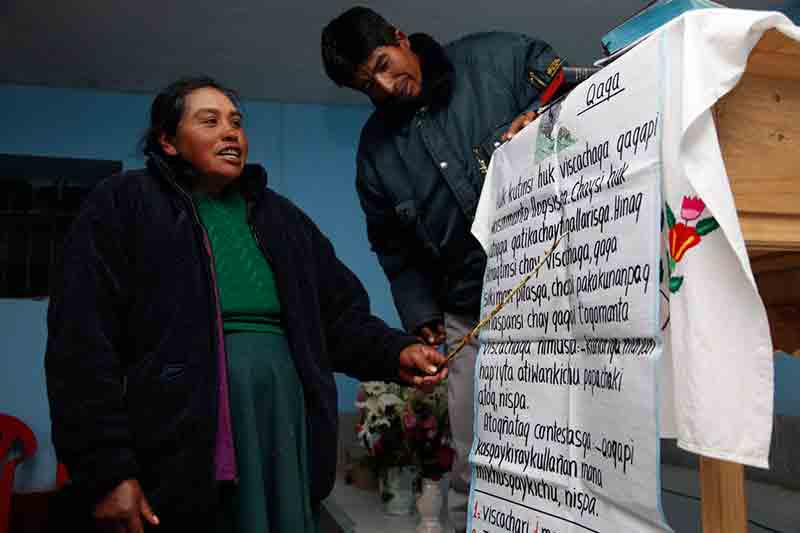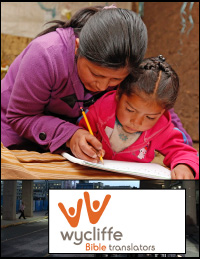Spreading the power of the written word
By Rajitha Sivakumaran
In the 14th century, an English theologian by the name of John Wycliffe began translating the Bible from Latin to English — his mission being increased accessibility to the teachings of the Christian faith for every literate person. Now, more than 600 years later, that is the mandate of Wycliffe Bible Translators of Canada. A participating organization of the Wycliffe Global Alliance (WGA) since 1968, this non-profit organization continually demonstrates the power of the written word by using Scripture translation, mother tongue literacy and education to build strong communities globally.
There are approximately 7,000 documented languages spoken in the world today, but a fully translated Bible exists for only about 550 of these languages. Presently, the Alliance is involved in nearly 2,300 language projects, distributed across 130 countries. Of these, Wycliffe Canada is actively engaged in 275 projects catered to a remarkable 224 million speakers.
“Our vision is a world where translated scriptures lead to transformed lives among peoples of all languages,” said Roy Eyre, Wycliffe Canada’s president since 2011.
Although initially a graphic designer by trade with fluency in only a single language, Eyre joined Wycliffe in 1997. Representing the organization’s mandate became his vocation and he did it rather artfully by intertwining the world of design and theology, and applying his skills as a designer to promote the vision of Wycliffe. Like Eyre, Wycliffe’s staff come from diverse educational backgrounds and specializations to fill a variety of roles, from linguists and translators to social media experts and software developers.
The organization traces its origins back to William Cameron Townsend, a California missionary worker, who went to Guatemala during the First World War era to sell Spanish Bibles to the indigenous Cakchiquel. It was a task doomed for failure as the Cakchiquel did not speak Spanish. Abandoning sales, Townsend lived alongside them in order to learn their language and customs, expanding his role from missionary to ethnographer.
In 1934, he founded Camp Wycliffe, a linguistics training school, which expanded into the Wycliffe Bible Translators and the Summer Institute of Linguistics a decade later. Townsend’s vision has now reached the far corners of the world with 890 Biblical translations completed and hundreds more progressing towards completion.
Translating the heart language
The role of the organization is to translate the Bible into what Eyre termed “the heart language”, which is simply another word for mother tongue, but Eyre offered a far more emotive definition: “Our identity is wrapped up in it — the idioms, the metaphors, the figures of speech that resonate with us and help define us — that’s the heart language”.
…it is all about “taking power from the elites and putting it into the hands of the people.”
Wycliffe does not limit itself to paper translations, particularly when it comes to serving those with impaired hearing. Although the American Sign Language serves as the predominant voice of the deaf in North America, there are an estimated 400 variations of sign languages worldwide. In order to cater to the needs of deaf individuals, the organization has partnered with Deaf Opportunity Outreach International and deaf translators to make the scriptures accessible through video.
In addition to translation, Wycliffe strives to increase mother tongue literacy in developing nations, which is a worthwhile investment to say the least. “Learning how to learn in your heart language will actually make you more successful at every stage of your life,” Eyre said.
This learning principle has been cited by various researchers and observed in UNESCO mother tongue literacy and learning programs carried out in Asia, Africa and South America. The concept is simple: Children who learn how to read and write in their native tongue before entering grade school will grasp the lingua franca of the educational system much more quickly. Since they are already familiar with the process of learning a language, studying a second language simply becomes a matter of application.
Wycliffe staff are avidly engaged in promoting health as well. In the midst of the 2014 Ebola outbreak, while the CDC deployed healthcare professionals to West Africa to treat the afflicted and contain the spread, Wycliffe staff worked behind the scenes to promote awareness. Translation efforts became focused on assembling information on the Ebola virus in languages endemic to the region in order to empower the people. Wycliffe has engaged in similar projects in Papua New Guinea and Africa about HIV and AIDS as well.
“The impact of Bible translation is extremely far-reaching and gets at the foundational areas within the culture and that’s the kind of thing we get really excited about — that’s our goal.” Roy Eyre, President of Wycliffe Canada
The mechanics behind Bible translation
Bible translation is no easy undertaking. A decade ago, it would have taken 20 to 25 years to translate only the New Testament. With the advancements of today, the average length has dropped by more than half. This is dependent upon many things, like demographics, geography, and political and health issues. Furthermore, learning a language takes years of commitment. Technology, however, can speed up the process.
“We built our own software because you can’t just buy this stuff off the shelf. Most of what you find on the shelf comes from our work,” Eyre said.
A good number of Canadians revert to Google Translate should a foreign word suddenly materialize. Although Eyre admits that software like Google Translate can eventually be helpful, a lot of work must be done first. This might include anything from creating an alphabet and written language to assembling vocabulary word lists to understanding the grammar and unique rules of each language. While vocabulary lists used to be recorded on index cards and stored in shoeboxes, sophisticated software has accelerated this task, increased consistency and enabled the handling of multiple dialects. Wycliffe has formed mutually beneficial ties with industry giants, like Google, Microsoft and Apple, to further their cause.
Methodology is also speeding up translation. Translation can take place in related languages simultaneously using a workshop approach, said Eyre. In places as diverse as Papua New Guinea, Nigeria, and Kenya, translation work is being led by the local community with support from Wycliffe staff. This is referred to as the Bible Translation Movement.
“It’s gone beyond any one organization. Wycliffe is one piece of it,” Eyre said.
Being a non-profit group, Wycliffe receives monetary contributions from a few businesses, corporations and foundations. But funding lies mostly in the hands of individuals ranging in the tens of thousands. About 1,000 churches provide regular contributions as well. Despite translating the Bible, Wycliffe does not generate profit from Bible sales.
Impact: Religion and democratizing conditions
“The impact of Bible translation is extremely far-reaching and gets at the foundational areas within the culture and that’s the kind of thing we get really excited about — that’s our goal,” Eyre said.
Immersed as it is in so many lives across the planet, Wycliffe’s impact on the world is substantial. Bible translation spirals far back into history and thus its impact lies in both historical and modern domains. Eyre referred to the research of a sociologist named Robert D. Woodberry to address this further.
Missionary workers, referred to as “Conversionary Protestants” (CPs) by Woodberry, are often linked to colonialism, but they may have paved the way for liberal democracy. Although secular thinkers may disagree about the extent of this influence, Woodberry argued that CPs promoted religious freedom, large-scale printing and newspapers, colonial reform and education for all. Eyre referred to these as the “democratizing conditions” that allowed for the spread of democracy across the modern world. Woodberry accredited particular importance to Bible translation.
According to Eyre, it is all about “taking power from the elites and putting it into the hands of the people”.
To learn more about Wycliffe Canada, visit www.wycliffe.ca.







